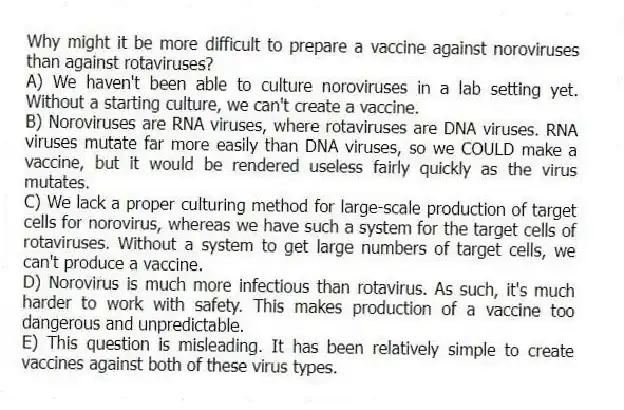
Why might it be more difficult to prepare a vaccine against noroviruses than against rotaviruses?
A) We haven't been able to culture noroviruses in a lab setting yet. Without a starting culture, we can't create a vaccine.
B) Noroviruses are RNA viruses, where rotaviruses are DNA viruses. RNA viruses mutate far more easily than DNA viruses, so we COULD make a vaccine, but it would be rendered useless fairly quickly as the virus mutates.
C) We lack a proper culturing method for large-scale production of target cells for norovirus, whereas we have such a system for the target cells of rotaviruses. Without a system to get large numbers of target cells, we can't produce a vaccine.
D) Norovirus is much more infectious than rotavirus. As such, it's much harder to work with safety. This makes production of a vaccine too dangerous and unpredictable.
E) This question is misleading. It has been relatively simple to create vaccines against both of these virus types.
Correct Answer:
Verified
Q70: Please select the False statement regarding tooth
Q71: Once H. pylori is in a host's stomach, what
Q72: What are possible complications of mumps?
A) Orchitis
Q73: Why are older people (over 65) more
Q74: Why is it that the tongue and
Q76: Which statement regarding CagA and VacA of
Q77: Only one serotype of mumps virus is
Q78: Why is it difficult to determine the
Q79: Would you expect an individual with giardiasis
Q80: Which of the following is specific to H.
Unlock this Answer For Free Now!
View this answer and more for free by performing one of the following actions

Scan the QR code to install the App and get 2 free unlocks

Unlock quizzes for free by uploading documents